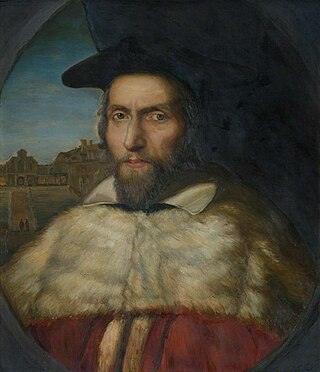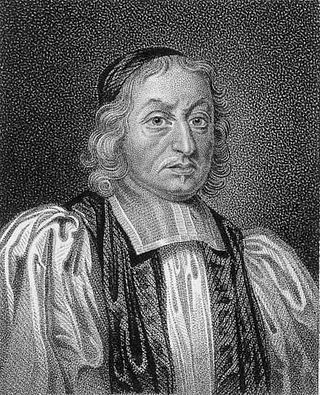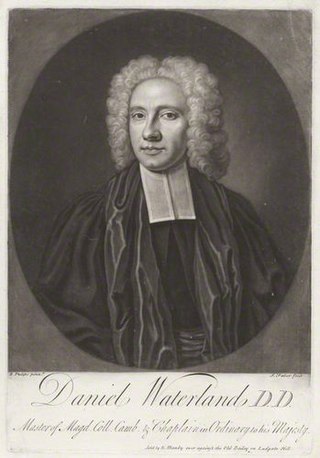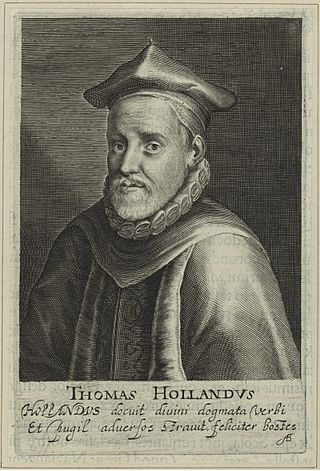Life
The son of John Creed, he was a native of Reading, Berkshire. He was elected a scholar of St John's College, Oxford, in 1631, proceeded B.A., was elected a fellow of his college, commenced M. A. in 1639, and graduated B.D. in 1646. During the First English Civil War he was a royalist, and preached several sermons before the king and parliament at Oxford.
He was expelled from his fellowship and from the university in 1648, but was able to hold the rectory of Codford St Mary, Wiltshire. At the Restoration he was created D.D.
Gilbert Sheldon persuaded Charles II to prefer Arminian William Creed to the regius chair of divinity.
Creed was appointed in June 1660 to the regius professorship of divinity at Oxford, with a canonry of Christ Church, Oxford. In July 1660 he became archdeacon of Wilts; he was also rector of Stockton, Wiltshire.
Creed died at Oxford on 19 July 1663.

John Cosin was an English bishop.
The Regius Professorships of Divinity are amongst the oldest professorships at the University of Oxford and the University of Cambridge. A third chair existed for a period at Trinity College Dublin.

John Pearson was an English theologian and scholar.

Daniel Waterland was an English theologian. He became Master of Magdalene College, Cambridge in 1714, Chancellor of the Diocese of York in 1722, and Archdeacon of Middlesex in 1730.

Thomas Holland was an English Calvinist scholar and theologian, and one of the translators of the King James Version of the Bible.

Robert Abbot was an Anglican bishop, academic and polemical writer. He served as Master of Balliol College, Oxford, Regius Professor of Divinity, and Bishop of Salisbury from 1615. Among his four younger brothers, George became Archbishop of Canterbury and Maurice became Lord Mayor of London.
William Ince (1825–1910) was a British theologian. He was Regius Professor of Divinity at Oxford, from 1878.

Francis Turner D.D. was Bishop of Ely, one of the seven bishops who petitioned against the Declaration of Indulgence and one of the nine bishops who refused to take the oath of allegiance to William III.
Laurence Womock (1612–1686) was an English bishop. He is best known for his controversial writings, some of which were signed Tilenus, after Daniel Tilenus, expressing his hostility to Calvinism in general, and the Synod of Dort in particular.

John Harris (Harrys) (c.1588–1658) was an English academic and clergyman. He was Regius Professor of Greek at Oxford, long-time Warden of Winchester College, and a member of the Westminster Assembly.
Samuel Collins (1576–1651) was an English clergyman and academic, Regius Professor of Divinity at Cambridge and Provost of King's College, Cambridge.
Thomas Tully (1620–1676) was an Anglican cleric.
William Jane (1645–1707) was an English academic and clergyman, Regius Professor of Divinity at Oxford from 1680.
Thomas Pierce or Peirse (1622–1691) was an English churchman and controversialist, a high-handed President of Magdalen College, Oxford, and Dean of Salisbury.
Thomas Laurence (1598–1657) was an English churchman and academic, Lady Margaret Professor of Divinity and expelled Master of Balliol College, Oxford.
Henry Jeanes (1611–1662) was an English clergyman and puritan controversialist.
William Delaune D.D. was an English clergyman and academic, President of St John's College, Oxford, and chaplain to Queen Anne.
Edward Boughen, D.D. (1587–1660?), was an English Royalist divine.
George Rust was an English Anglican academic and churchman, who became bishop of Dromore in 1667. He is known as a Cambridge Platonist and associate of Jeremy Taylor.

Henry James was an English clergyman and academic at the University of Cambridge, who served as President of Queens' College, Cambridge 1675–1717 and Regius Professor of Divinity 1699–1717.
This page is based on this
Wikipedia article Text is available under the
CC BY-SA 4.0 license; additional terms may apply.
Images, videos and audio are available under their respective licenses.
 This article incorporates text from a publication now in the public domain : "Creed, William". Dictionary of National Biography . London: Smith, Elder & Co. 1885–1900.
This article incorporates text from a publication now in the public domain : "Creed, William". Dictionary of National Biography . London: Smith, Elder & Co. 1885–1900.






